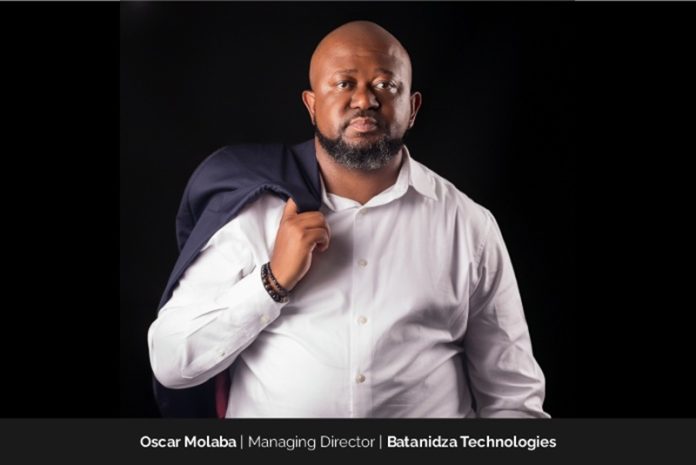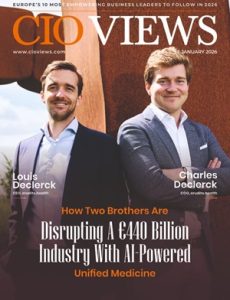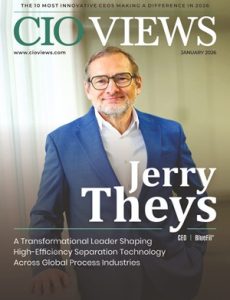Oscar Molaba, Managing Director of Batanidza Technologies, is an enabler of employment opportunities. When his company secured its largest client to date, Oscar ended up facilitating the creation of 80 new jobs, with 80% of those roles filled by unemployed individuals. The impact of this goes beyond just employment numbers. “For every job created, there was an average of eight dependents who benefited,” he explains. “So, when we created 80 jobs, we didn’t just change 80 lives – we impacted families and communities.” That, to him, is success.
“The bottom line is secondary — what truly matters is the impact we create,” Oscar says. “That’s the driving force behind our organization. The ultimate purpose of it is to create a domino effect by helping one person reach their goal they will go forth and assist someone us to do the same, ensuring that the dots connect.
Drawn to the ‘Limitless’ Characteristic of ICT
Oscar was drawn to Information and Communication Technology (ICT) because of its “limitless” potential. When he stepped into this industry more than two decades ago as a high school student, it was beyond the internet bubble, and not many considered it a viable career path. Oscar, however, recognized its boundless potential. In addition to its “limitless” nature, what attracted him to the technology space was its rapid advancement and constant evolution. “Just as the industry has evolved, I’ve evolved within it,” Oscar says.
He now has 18 years of experience in ICT consulting, business development, business management, and strategic growth. He excels in leading high-impact initiatives, securing complex deals with large corporates, and navigating both start-up and established corporate environments.
Founding Batanidza Technologies
Batanidza is a dynamic, innovative company at the forefront of providing progressive ICT support services and solutions to South Africa’s leading corporates. Its aim is to be recognized as a leader in ICT services provision in the digital age. The decision to found Batanidza stems from Oscar’s experience when he was working as a consultant.
During that time as a consultant, he felt like he was “just a number” helping companies reach their bottom line rather than being valued as an individual contributor. This realization ignited his interest in creating a consulting practice for the benefit of consultants. “Consultants ought not to feel like a number, but ought to feel like they matter,” Oscar explains. “We are there not only for delivery but for a purpose bigger than being a number to get to a bottom line.”
One of the core founding principles of Batanidza is to take better care of their tribe – the multiple stakeholders in the organisation. Oscar points out that they serve as a platform for talent to tap into their full potential allowing them to be thought leaders in the industry and in their personal capacity.
As for the company’s growth since its inception, Oscar says that it has followed the natural ebb and flow of business. “It’s what they call the hockey stick effect,” he adds. “It grows, dips, and then rises again – and the cycle continues.”
Oscar and his team conduct themselves from a logical point of view. He explains that when they arrive at a client’s site, they ask themselves, “What are we doing here?” They then build a framework around that answer. “We’re not here just to click, we’re here to deliver a service that creates an impact on a larger scale,” Oscar points out.
Challenges of Day-to-Day Operations
Everything continues to be a challenge in day-to-day operations, says Oscar. He also points out that the consultancy space is an ecosystem of different stakeholders. These include employees or consultants, clients, and the organization that carries out the work. Also, according to Oscar, there are partners belonging to the different disciplines in the technology space.
For him, personally, the most challenging aspect of leading Batanidza is finding the right personnel to join the tribe. Batanidza has a certain set of values Ubuntu, Respect, Happiness, Fulfillment, etc. Finding people that resonate with these values can be daunting at times because, at Batanidza we are more than just colleagues or a family, we are a Tribe.
Dealing with clients who are only chasing the bottom line also poses a challenge for him. “They don’t see the holistic view of why a particular organization is servicing them and the broader benefits apart from the bottom line,” Oscar says. “Their focus is mainly on saving, avoiding spending, or not overspending.”
Additionally, there are partners, certain OEMs, who are chasing a certain number of sales instead of being optimal about what they are selling to their clients. Oscar says that this, too, continues to challenge him.
“And I’ll take a moment to reflect on myself,” he adds. From a personal standpoint, what challenges him the most is that, in the past, he was not always the kind of leader who took care of his people – being more present, more engaged, and more in tune with the bigger purpose and he has started to focus on that as he continues to work on himself to improve as a leader.
Responsibilities of Managing Director
Oscar handles a great number of responsibilities because of the size of his organization, which is still in the growth stage. Well-established companies have dedicated departments for Marketing, Sales, HR, Legal, Finance & Accounting, and business development. Because of the size of his organization, Oscar has personally overseen all these areas since the beginning, keeping his finger on the pulse.
“I have to look after these areas until we have grown enough to scale and can employ people who specialize in those roles,” he says.
Now that Batanidza is at a stage where it is scaling, Oscar is planning on bringing in relevant stakeholders to manage different departments. Once this shift happens, he believes that there will be a change in his role. Oscar describes the natural structure of an organization as having three levels: strategic (executives, board members, and shareholders), tactical (management), and operational (day-to-day execution). In the early days, he worked across all three, but now, his focus is narrowing.
“As we are seeing the company scale, I am focusing more on the tactical and strategic aspects. Soon enough, I will be working exclusively at the strategic level,” Oscar says. “I think that is the wonder of building a company and watching it grow – seeing your own role evolve alongside it.”
Oscar believes in being a leader who serves. He works alongside his team in the trenches. “Not even for a moment do I remove myself from the ability to execute and deliver a particular task,” he says.
As Oscar oversees almost all aspects of his business, how does he maintain a work-life balance? According to him, finding this equilibrium hasn’t been easy. In the past, he was solely focused on his work.
“But I speak to you today differently from the past when I wasn’t a father. I’m a father now,” he says. This has transformed his approach immensely. Oscar strives to maintain a balance between his professional and personal life by getting more in tune with the idea that his time at home is his time at home, and not his work time. He gets up early and stays up late to complete his tasks. “But, when I get home at certain periods of time, then I switch off from work,” Oscar says.
Passionate About Making an Impact
Oscar and his team derive motivation from their passion for making an impact in the industry. According to him, “it starts from asking, what are we doing where we are, and why are we doing what we do there?” And he is a leader who always tries to ensure that his team is taken into confidence, not only regarding the strategic outlook of the company itself, but also for their own specific strategic outlook to impact on their career trajectory.
“The more they understand that they are there to deliver a service with a certain purpose and impact, the more I believe it helps keep all of us motivated and they will grow from that,” Oscar says.
Plans and Learning from Past
Oscar intends to not only grow his company but also create more employment opportunities. In the past, the company and his team often had tunnel vision because of his leadership approach. Oscar shares that he was stuck with managing accounts himself, which harmed the company’s progress. Oscar has changed his approach. Now, he empowers other people so that they can serve their own client accounts, while he is serving the company at a more strategic level. Oscar’s change in leadership style has yielded tangible results.
“As a result, we’ve actually gone on to sign multiple clients at once in the first quarter of this calendar year alone, which has never happened in the past,” Oscar says. “I think the previous challenges have taught us how to do things differently. And through an iteration process, we’ve reached where we are now, albeit that there is still a long way to go still.”
Rapidly Evolving Technology Industry
Oscar notes that the technology industry is evolving day in and day out. To prove that, he gives the example of the fields they specialize in: software quality assurance and testing “Testing as a Service (TaaS)”. He points out that it started with manual testing, then evolved into automation, followed by API testing, and continuous testing. “Now, it is about generative AI in testing,” Oscar says.
He also explains that there are different stages of evolution – just like the world generally, and all that one needs to do is apply the latest advancements in technology. Oscar encourages his workforce to keep themselves relevant by continuously learning new skills and keeping up with the pace of technology.
Breaking Barriers
As the technology is advancing rapidly and constantly changing, there is a need to break the barriers to entry, Oscar points out. He shares that the other day, his team asked him, “whether he believes access to the internet is a human right.”
“My answer was an emphatic, ‘yes’,” he adds. In today’s world, if the industrial revolution is centered around the internet, people should not be excluded from it, he says. He feels there should be no reason for people to still use outdated systems, walk long distances to catch a minibus taxi, or public transport, or queue for ATMs. He points out that digital transactions are still not common in certain parts of South Africa.
“What do I want to do about it? We are launching a foundation for internet development to break down the barriers to internet access so that we can increase online traffic, responsibly,” Oscar informs.
Although the rapidly evolving technology landscape can be intimidating, Oscar does not believe in shying away from further development. “It is because the targets are always moving,” he says.
“In consulting, professionals must upskill themselves to meet the technology landscape where it is or where it will be in the future,” Oscar adds. “We also need to do the same with end-users.”
Views on Competition
Oscar views competition as an opportunity for collaboration, which he believes naturally leads to innovation. He explains that collaborating with competitors creates opportunities to learn from one another. Through this exchange, innovation comes more easily.
However, he also points out that some competitors, such as bigger players, often block the entry of new entrants. “They often create barriers that some new entrants can’t overcome,” he says. “But what they can’t do away with, for example, are people who have strong IP about the industry, those who know how to navigate it and service clients.”
Oscar shares that recently, they engaged with a potential partner larger than them. During this session, they kept giving examples of a client who was potentially both Oscar’s client and theirs. Eventually, Oscar asked, “Do you have them as a client?” The answer was, “No, we don’t, but we keep knocking.”
“They weren’t aware that we had already signed that client,” Oscar says. He explains that this shows that whether one is a small or big player, they can be the perfect fit based on what they bring to the table.
Influencing the Next Generation
Oscar’s remarkable success in building a company from scratch has made him an inspirational figure in Africa. He is also a role model for the next generation. He wants to influence them by boosting their confidence and reinforcing the idea that “the world is your oyster.”
“What I would like to leave as a lasting impression is that they truly can go into the world and become just about anything,” Oscar says, “as long as they apply themselves, research, and approach it in a right manner.” He explains that it should not be about what they stand to gain from a monetary point but rather about the impact they can make.
Message to Aspiring Leaders
“Don’t chase the money,” Oscar tells aspiring leaders in the ICT space. “Chase cause and effect, as well as impact, and most importantly prioritize your people.”





